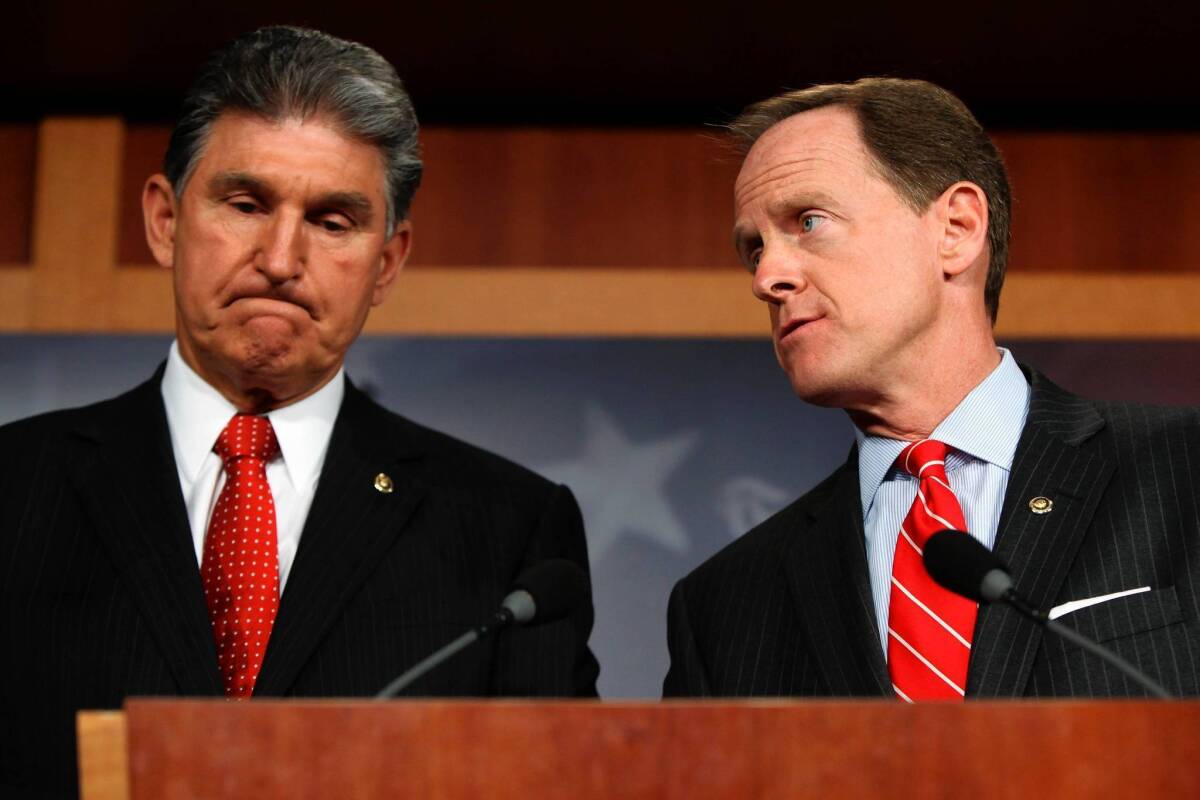Proposed gun amendment faces uphill battle in Senate

- Share via
WASHINGTON — A single conversation on the Senate floor Monday illustrated the challenges senators face in pushing a bipartisan measure to extend background checks to most gun sales.
Sen. Joe Manchin III (D-W.Va.), the chief author of the proposal, spent some 20 minutes lobbying Alaska’s two senators, one a conservative Democrat who faces reelection in 2014 and the other a Republican who has sometimes broken with her party.
Neither the Democrat, Sen. Mark Begich, nor the Republican, Sen. Lisa Murkowski, has committed to the proposal, which could be the most far-reaching gun legislation to pass the Senate in more than two decades. But they listened intently, quizzing Manchin about specific provisions and suggesting revisions they might seek. Murkowski even teased Manchin that his hair has grayed since he took up the issue.
As senators returned to Washington on Monday, there were other signs that the accord brokered by Manchin and Sen. Patrick J. Toomey (R-Pa.) last week was shy of the votes it would need to be adopted as an amendment to a larger package of gun legislation. That measure includes provisions to authorize more spending on school safety and to crack down on gun trafficking.
Senate leaders had promised that the Manchin-Toomey proposal would be the first amendment considered, but one leadership aide said no votes would occur on any amendment until at least Wednesday.
Manchin said the extra time could work to his advantage. In conversations with his colleagues, Manchin said he was making a simple plea: Read the amendment. As he spoke with reporters, Manchin clutched a stack of personal letters — some with handwritten notes — that he planned to deliver to senators asking for their support.
He and Toomey also appeared on the Senate floor for nearly 90 minutes Monday afternoon, making the case for their amendment and stressing their backgrounds as solid gun-rights supporters.
“Basically, we looked at the gun culture in America — who we are and how we became who we are — and that’s what we took into consideration,” Manchin said.
Toomey, seeking to differentiate the proposal from more extensive gun restrictions proposed after the Newtown, Conn., school shooting, insisted the amendment “isn’t gun control.”
“There are other members of this body who are not happy with this bill because they want active, aggressive gun control,” such as bans on certain weapons or ammunition, he said. “But trying to keep guns out of the hands of people who aren’t legally entitled to have them — dangerous people, be they criminals or dangerously mentally ill people — that’s not gun control. That’s common sense.”
After Toomey left the Senate floor, he headed for the office of Senate Minority Leader Mitch McConnell (R-Ky.). Key to the prospects for gun legislation will be an agreement McConnell must make with Senate Majority Leader Harry Reid (D-Nev.) over how many amendments the Senate will consider and on what terms.
A band of more conservative GOP senators have threatened to require a 60-vote threshold for amendments they view as a threat to 2nd Amendment rights. The background check proposal appears to have more than 50 votes, but not enough for a filibuster-proof majority.
Democrats hold 53 seats, and two independents caucus with them. But two Democrats voted against considering the larger gun bill last week and are expected to oppose many of their party’s amendments. The votes of several more who face reelection in 2014 are not guaranteed.
Another challenge is the continued absence of Sen. Frank R. Lautenberg (D-N.J.), who has missed votes for weeks because of illness. His office said he hoped to return this week.
The National Rifle Assn.’s opposition worries red-state Democrats, who are wary of the group’s campaign clout. But two smaller gun-rights groups, the Citizens Committee for the Right to Keep and Bear Arms and the Independent Firearm Owners Assn., endorsed the proposal over the weekend.
The number of swing votes appeared to narrow, not expand, on Monday. Some senators who voted last week to begin debate on the bill announcing they would oppose the background check measure.
Sen. Jeff Flake (R-Ariz.), who has been intensely lobbied by gun-control advocates, said he opposed it because it would expand background checks to all commercial sales, which he said was “too far.”
The shrinking margin puts more pressure on Democrats, particularly those from conservative, rural states. Sen. Kay Hagan of North Carolina, who is up for reelection in 2014, said she would support the proposal.
But five other Democrats have not indicated how they will vote. “I’m still listening to people from throughout Louisiana and my colleagues,” said Sen. Mary L. Landrieu, a Democrat who is also up for reelection.
A positive sign came from Sen. Jon Tester of Montana, a Democrat just reelected to a second term. He joined Manchin and Toomey on the Senate floor to announce his support.
“This bill will not solve all the violence problems in this country, not even close,” Tester said. “But is it a step in the right direction while protecting my 2nd Amendment rights? Yes, it is.”
More to Read
Sign up for Essential California
The most important California stories and recommendations in your inbox every morning.
You may occasionally receive promotional content from the Los Angeles Times.












